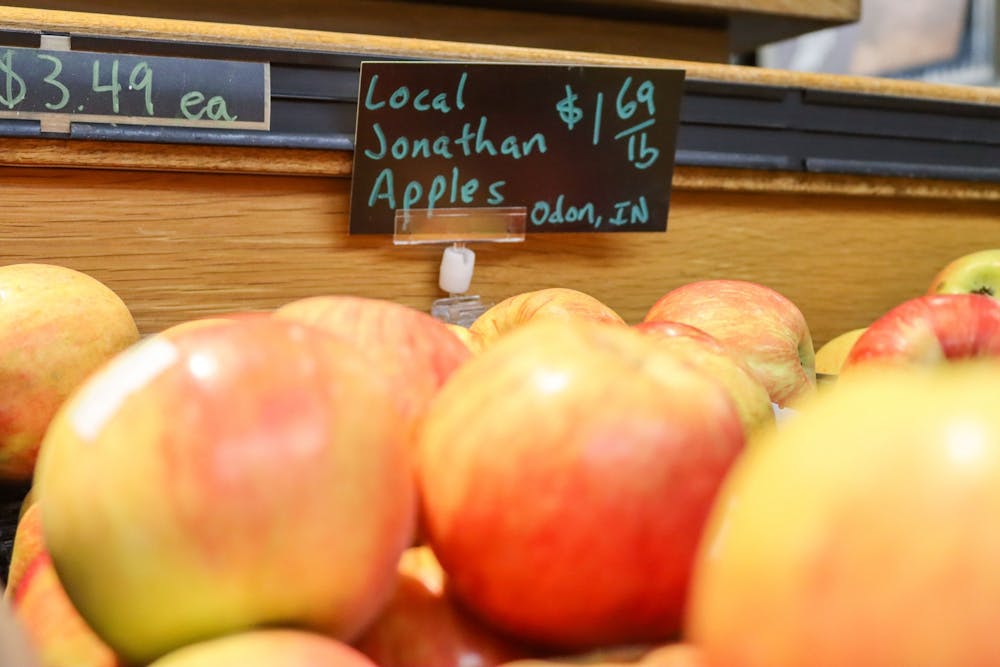Local Bloomington restaurants are buying products from local farmers because of product quality, sustainability and a desire to support the local economy.
Some farmers in the Bloomington area have largely transitioned to direct-to-consumer sales, in part of a trend of the changing service and restaurant industry. However, for some local restaurants, sourcing from local farms is an important part of their business and how they view the Bloomington economy.
Cody Gradolf, head chef at Osteria Rago, said he thinks sourcing local products brings a community aspect to his restaurant.
Gradolf said sourcing local products is a lot more expensive than using conventional food producers and purveyors, so Osteria Rago uses both local farmers and conventional produce because of financial constraints.
Gradolf said Osteria Rago shops from local farmers because the quality of local products is better than conventional products, but they also think it’s important to help the farmers.
Gradolf also said the pandemic has had some negative effect on sourcing locally.
“Next door, Village Deli, they were using like 90 dozen Rhodes Farm eggs a week and then they closed down. They stopped,” Gradolf said. “So when those farmers have to, you know, take a cut, a loss in what they are selling, our price goes up a little bit.”
Gradolf also said he hopes restaurants support more local farms, but that he could not fault them if they didn’t because they may need to prioritize other expenses to continue to stay open.
Osteria Rago has only been open for four years, and Gradolf says they will continue to grow their relationship with local farmers.
“We are going to try to continue to use more local products and try to help out the community as much as we can in that regard,” Gradolf said. “So, if anything we, you know, will ultimately be using more and more local ingredients as the time passes.
Gradolf said by summer he hopes to build relationships with two or three more farmers to source product from.
Eric Bueno, executive chef of Feast, says one of the reasons they source locally is because of better product and more versatility and variety that he might not be able to find elsewhere.
“The second reason is really to kind of create a relationship with the community,” Bueno said. “A lot of them — they rely on the farmer’s market and that’s one source of income, but I open up another source that they can sell mass, bigger quantities and help their farm grow, thus helping them get new products or new varieties of produce.”
Labor shortages in the service industry and an increase in customer demand has put strain on sourcing for Bueno.
“I have really fought to stick with the farmers during this whole thing, and I think Feast never closed once during COVID,“ Bueno said.
Bueno also said the farmer to restaurant relationship he has built with local farmers has been an important part of the word-of-mouth reputation of his business.
Rachel Gogocha, a manager at Hive, said business is slower and they haven’t ordered as much, but she said the sourcing from the farms they do buy from has been consistent.
Hive’s parent company is OneWorld Enterprises, which also includes Pizza X, Lennie’s and Bloomington Brewing Company.
“The whole company in general is passionate about sustainability and passionate about sourcing things locally,” Gogocha said “We definitely see the value in supporting local farmers, local businesses within Bloomington and within Indiana as well.”
Gogocha said the price of local produce may be higher, but Hive’s customers expect the local sourcing and they come to eat being aware of that.
Gogocha said sourcing from local farms allows more transparency and connection and that sourcing produce outside of the community does not provide that. She also thinks boosting profits for local farmers is more important than doing the same for big corporations.
“You’re giving more to these local farmers and more to the local economy too,” Gogocha said. “So, if possible, I would say to other restaurants to source locally if they are able to.”




